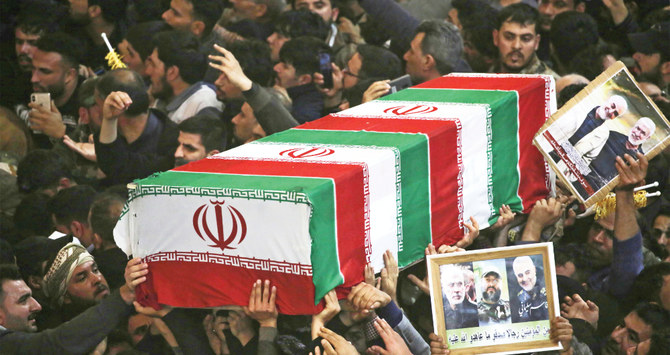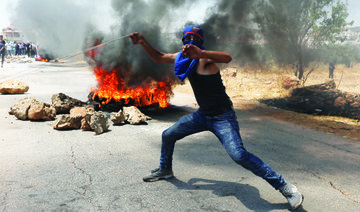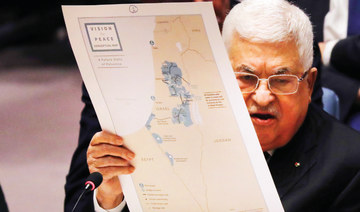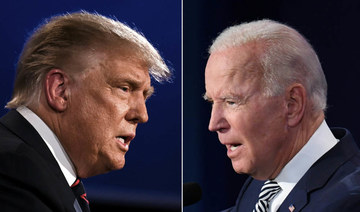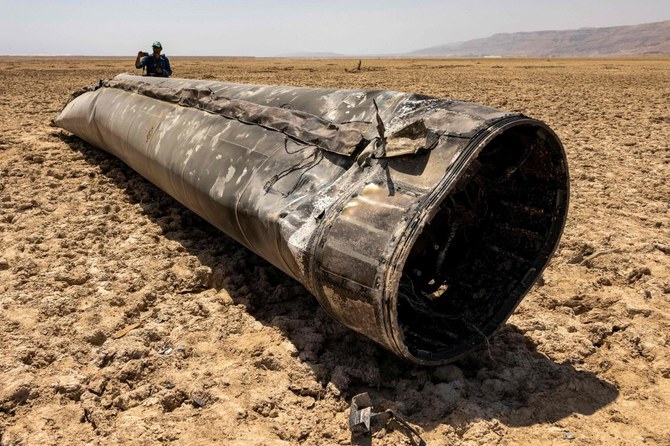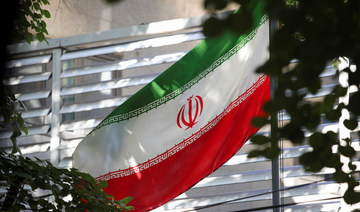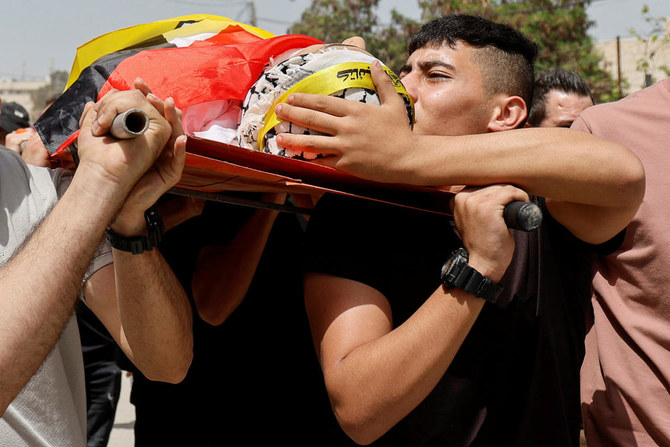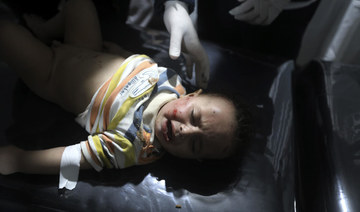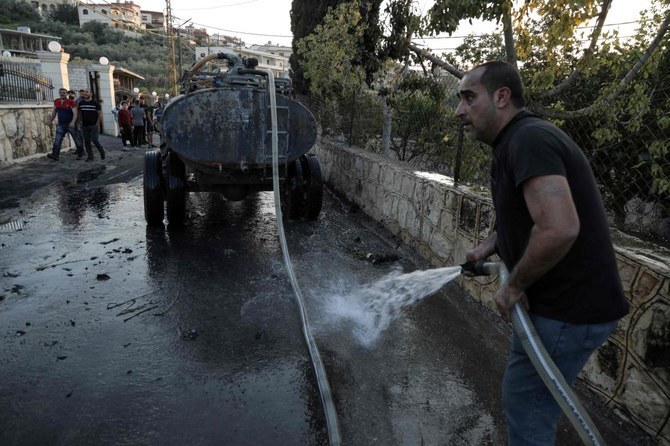BEIRUT: Regardless of the outcome of the Nov. 3 presidential election, US President Donald Trump does not have to worry about one thing: being accused of leaving the Middle East in a worse condition than he inherited it. Judging by the Arab News/YouGov pan-Arab survey’s findings, that dubious honor goes to his predecessor, Barak Obama, whose vice president Joe Biden is now Trump’s main challenger.
In a nutshell, the study shows that Arabs broadly support Trump’s iron-fist approach towards the Iranian regime, although they oppose his decision in 2018 to transfer the US embassy in Tel Aviv to Jerusalem. And even though he is seen as not better for the Arab region than his Democratic opponent, far more respondents were aware of him than Biden. Some of his policies were also viewed favorably in specific parts of the Arab world.
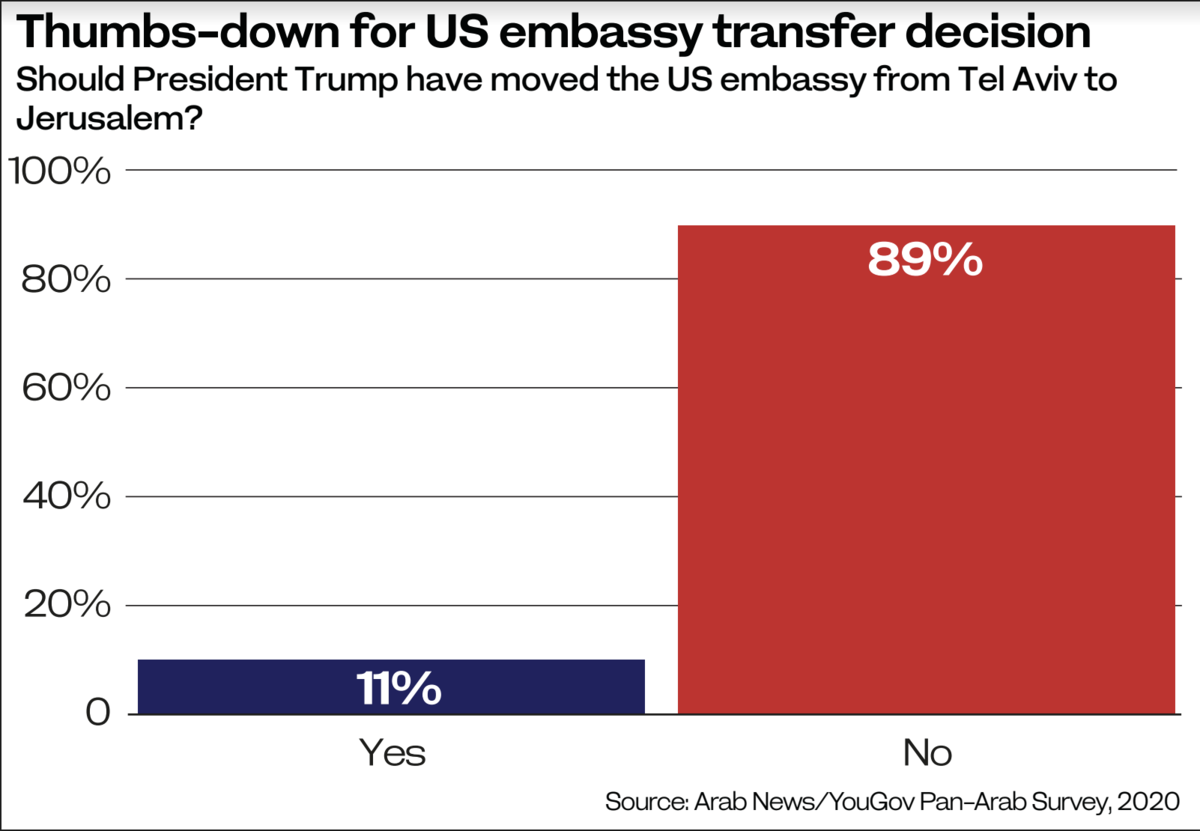
While gone are the days when a White House occupant could run for a second term on their foreign-policy achievements, there is no denying that the US remains a global power whose decisions affect the lives of people from Central America to the Middle East. As such, the importance of understanding what the Arab world is anticipating from a future US administration cannot be overstated.
Covered extensively by the Arab news media, the first big news story of 2020 was the elimination of Iranian Major General Qassem Soleimani, head of the Islamic Revolutionary Guard Corps’ (IRGC) extraterritorial Quds Force. Soleimani was on his way to meet the Iraqi prime minister when he was killed in a US drone strike near Baghdad airport on Jan. 3.
According to the survey, opinion in the Arab world overall is divided on the regional impact of the killing.
Respondents in Yemen were very supportive of the action, with 71 percent approving it as a positive move, as were many residents of Saudi Arabia (68 percent) and Iraqi (57 percent). In contrast, some 59 percent of respondents in Lebanon and 62 percent in Qatar said it was a negative move for the region.

“The poll accurately assesses the interests of Arab states,” said Dr. John Hulsman, president and managing partner of John C. Hulsman Enterprises, a prominent global political risk consultancy.
“For people who knew Soleimani in Iraq, he was part of the problem … as a satrap (viceroy) of Iran. They are delighted in Iraq now they have a vaguely reformist prime minister who is vaguely tolerated by Iran and the US. And that couldn’t have happened with Soleimani there.”
On the other hand, Hulsman said, “If you live somewhere where there is an American base in the region (such as Qatar), then Soleimani’s killing might mean that you are next, because no one thinks the Iranians are going to forget that Soleimani died.”
Under the circumstances, why did 40 percent of the Arab News/YouGov survey’s respondents say Biden would be better for the Middle East, as opposed to the 12 percent who said the same thing about Trump?
For one thing, analysts point out, an even larger number, 49 percent, felt neither candidate would be better for the region.
For another thing, they note that just a little more than half of the respondents (53 percent) said they were aware of Biden compared to a massive 90 percent who were aware of Trump. Besides, they say, the points scored by Trump by taking a hard line on the Iranian problem are outweighed by the consequences of the Jerusalem embassy transfer decision, which was opposed by 89 percent of the respondents.
READ: The methodology behind the Arab News/YouGov Pan-Arab Survey
According to David Romano, Thomas G. Strong professor of Middle East Politics at Missouri State University, Iran remains the key issue in understanding the Arab world’s bad aftertaste from the Obama administration. “When it comes to the Arab states, Biden is a lot like Obama,” he told Arab News. “They are not sure if he’s the kind of president who will throw them under the bus like many feel Obama did to (former Egyptian President) Hosni Mubarak.”
Trump, by comparison, might represent stability for the Middle East. “Trump has come through on his word. He sent more troops to Saudi Arabia and he’s been harder on Iran,” Romano said.
Presumably, by the same token, about one fifth of GCC residents believe Trump’s withdrawal from the Obama-era Joint Comprehensive Plan of Action (JCPOA), better known as the Iran nuclear deal, has boosted safety in the region (led particularly by 49 percent of Saudi nationals).
Furthermore, residents of countries intimately tied without a choice to Iran said they want a combative stance from the next US president, including toughened sanctions and a war posture. These included: Iraq (53 percent), Yemen (54 percent) and Saudi Arabia (49 percent).
“The Trump team came in and decided that Obama’s efforts, particularly with the JCPOA, were a disaster because it bankrolled a whole list of people who want America out of the region and who don’t want stability in the region. They want to dominate the region,” Hulsman said.
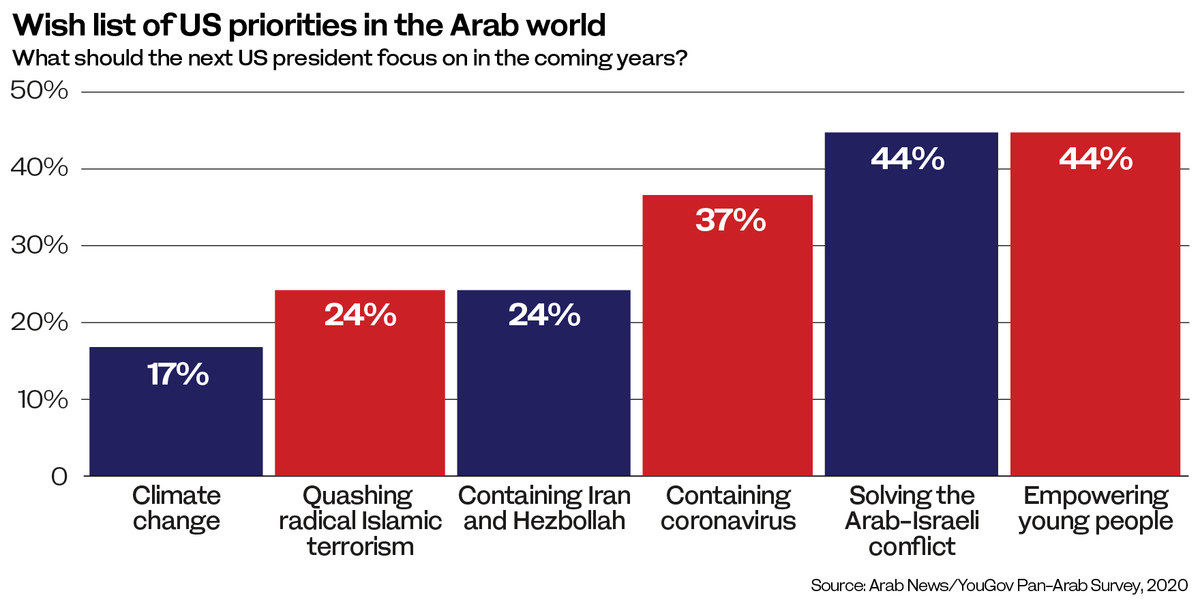
The fear among many is that Biden may abandon Trump’s “maximum pressure” campaign on Iran. “From the point of view of the Middle East, this is one of those moments that looks like whiplash. If you are living in the region, this is zig-zag diplomacy,” Hulsman said.
It is not just analysts who are deeply skeptical about Biden’s stance on Iran, fearing a return to the perceived weak-kneed and irresolute approach of Obama.
Agop K, a Lebanese-Armenian-American attorney who lives in Beirut but practices law in the US, said “we need an iron fist here in the Middle East, unfortunately. And Trump represents that.”
Speaking to Arab News, he said: “As long as the pressure is on Iran and Iran is being sanctioned and cut off from financing, this is what might help us down the line in Lebanon. If I wanted to vote for Trump, this is one of the biggest reasons I would do so.”
Twitter: @rebeccaaproctor



